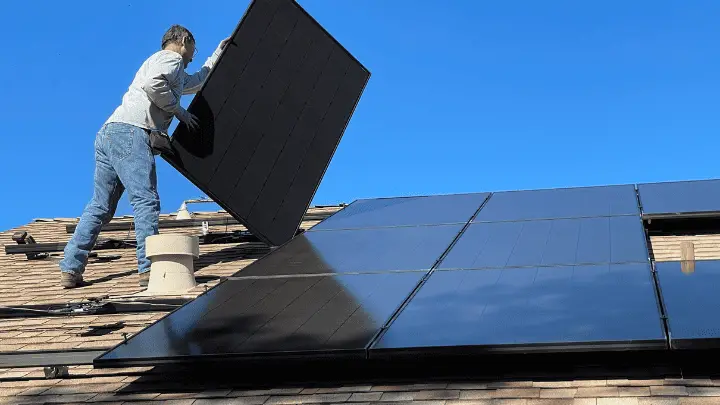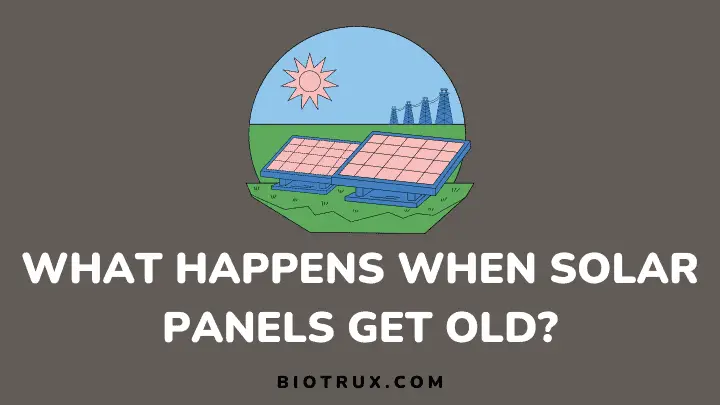Like any other technology, solar panels will eventually wear out as time passes. While solar panels are known for longevity, their efficiency gradually decreases as they age. The degradation of solar panels is a natural process, but what exactly happens when they get old?
In this article, you will explore the factors contributing to solar panel degradation and what you can expect once your panels reach the end of their lifespan. I will also address some of the most commonly asked questions about solar panel degradation to help you maintain and optimize your solar panels.
What is Solar Panel Degradation?
Solar panel degradation refers to the gradual decrease in a solar panel’s ability to produce electricity over time. This natural decline can occur due to various factors, such as exposure to sunlight, temperature fluctuations, and general wear and tear.
As solar panels age, their energy output and performance may gradually decrease, leading to reduced efficiency and a need for replacement.
It’s important to understand this process when considering investing in solar panels for your home to plan for maintenance and potential upgrades in the future.
Reasons Why Solar Panels Degrade
1. Environmental factors
Solar panels are exposed to various environmental conditions such as temperature extremes, humidity, ultraviolet (UV) radiation, and weather events like hailstorms and heavy rains. Over time, these factors can lead to physical damage and deterioration of the panel components.
2. Material degradation
The materials used in solar panels, such as silicon wafers, encapsulation materials, and metal connectors, can degrade over time. Silicon-based solar cells experience a phenomenon known as “light-induced degradation” or “LID,” where their efficiency decreases after initial exposure to sunlight. This effect is temporary and typically stabilizes after a few months.
3. Potential-Induced Degradation (PID)
PID occurs when there is a voltage difference between the solar cells and the ground. This voltage difference can cause a leakage current that degrades the performance of the cells over time. However, modern solar panels are designed to minimize PID through improved materials and construction techniques.
4. Manufacturing defects
Although rare, manufacturing defects can lead to premature degradation of solar panels. These defects may include issues with soldering, improper sealing, or substandard materials. Manufacturers often provide warranties to cover such defects and ensure panel longevity.
5. Inverter failure
The inverter is an essential component of a solar system that converts the DC electricity generated by the panels into AC electricity for household use. Inverters have a lifespan of around 10 to 15 years and may need replacement during the life of a solar panel system. Inverter failure can impact the system’s overall performance and reduce energy production.
How Fast Do Solar Panels Degrade?
Solar panels degrade at different rates depending on their type and quality. Most solar panels have a yearly degradation rate of 0.5% to 1%. This means that after 25 years, solar panels could still operate at 75% to 87.5% of their initial power output.
However, some high-quality solar panels can have degradation rates as low as 0.25% per year. This means they can still operate at 93.75% of their initial power output after 25 years. Overall, solar panels are designed to last for several years and provide a reliable source of clean energy for many years with proper maintenance and care.
However, it’s worth noting that many manufacturers provide performance warranties guaranteeing a minimum efficiency level (e.g., 80% or 85%) after a specific number of years, typically 25 or 30 years.
Ways To Extend the Life of Your Solar Panel
Solar panels are a valuable investment in the long-term energy savings of your home. However, they require proper maintenance and care to ensure they last as long as possible. Here are three ways you can extend the life of your solar panels:
- Keep them clean: Dirty solar panels can decrease efficiency and power output. Regularly clean your panels with water and a soft-bristled brush to remove dirt, debris, and bird droppings. Consider hiring a professional cleaning service if your panels are in a hard-to-reach location.
- Trim surrounding trees: Overhanging branches or nearby trees can cast shade on your solar panels and reduce their output. Trim back any branches that could obstruct the sunlight from reaching your panels. This will increase their efficiency and protect them from potential damage during storms.
- Monitor performance: Keeping an eye on the performance of your solar panels will help you identify any issues before they become serious. Use a monitoring system to track energy production, and if you notice a significant drop in output, investigate the cause. This could be due to a problem with the panels or the inverter.
Caring for your solar panels can extend their lifespan and maximize your investment. Incorporating these simple maintenance steps into your routine can help keep your panels at their full potential for years.
Do Solar Panels Degrade in Storage?
Solar panels can degrade if not properly stored. When storing solar panels, keeping them in a dry and temperature-controlled environment is crucial.
Exposure to extreme temperatures, moisture, or excessive humidity can lead to the degradation of materials and performance issues.
It is recommended to store solar panels in a cool, dry place and avoid subjecting them to harsh environmental conditions for extended periods.
What Should You Consider When Installing Solar Panels on Your Roof?

When considering installing solar panels on your roof, several factors need to be taken into account:
1. Roof orientation and tilt
The orientation and tilt of your roof affect the energy production of solar panels. Solar panels should face south (in the Northern Hemisphere) or north (in the Southern Hemisphere) to receive maximum sunlight throughout the day. The tilt angle should be optimized based on your geographical location.
2. Shading
Shading from nearby structures, trees, or chimneys can significantly impact the performance of solar panels. Evaluating potential shading issues and designing the solar array is essential. Shading analysis tools or consulting with a solar professional can help identify and mitigate shading concerns.
3. Roof condition and load-bearing capacity
The condition of your roof is crucial for solar panel installation. Ensure that your roof is in good condition and can support the additional weight of the panels. If necessary, reinforce or repair the roof before installation. Consulting with a structural engineer or a solar installer can help determine the load-bearing capacity of your roof.
Do Solar Panels Degrade When Not in Use?
Solar panels can experience minimal degradation when not in use, but it is insignificant compared to the overall degradation over their lifespan. Properly stored solar panels in a dry and temperature-controlled environment will maintain their efficiency during periods of non-use.
However, it is essential to regularly inspect and maintain the panels, even during periods of inactivity, to ensure their optimal performance when you use them again.
What Happens When Solar Panels Get Old?
Solar panels are designed to last a long time, typically 25 to 30 years. However, as with any technology, they will eventually end their lifespan. When solar panels get old, their efficiency starts to decrease.
This means they will produce less electricity than when they were new. As solar panels age, they may also develop cracks, discoloration, or other types of damage. These issues can further reduce their efficiency.
Eventually, the panels must be replaced to maintain optimal energy production.
Are Old Solar Panels Worth Anything?
Although old solar panels may experience a decline in efficiency and performance, they may still hold value. Some organizations or individuals may be interested in purchasing old solar panels for various purposes, such as research, experimentation, or off-grid applications.
Additionally, recycling companies often accept old solar panels and extract valuable materials like silicon, glass, and metals for reuse. Therefore, it is recommended to explore options for selling or recycling old solar panels rather than disposing of them in landfills.
FAQs
How can you determine if your solar panels are getting old?
Monitoring the performance of your solar panels can help determine if they are getting old. Regularly check their energy output and compare it to their initial performance. If you notice a significant decrease in energy production, it could indicate degradation.
Can you prevent solar panels from getting old?
While preventing solar panels from getting old is inevitable, there are ways to slow down the process and extend the panels’ lifespan. Regular maintenance, monitoring system performance, and upgrading components when necessary can help minimize degradation.
Do all solar panel brands degrade at the same rate?
Solar panel degradation rates can vary among different brands and models. Factors such as the quality of materials, manufacturing processes, and overall design can influence the degradation rate. Researching and choosing reputable brands known for their durability and long-lasting performance is advisable.
Final Thoughts
In conclusion, solar panels are a reliable and sustainable energy source that can provide power for several decades. While they inevitably degrade over time, the degradation rate is relatively slow and can be mitigated through proper maintenance practices.
If you’re worried about your solar panels’ lifespan, many options are available to extend their longevity. Upgrading panels, cleaning and maintaining systems, and recycling old components are all excellent ways to ensure that your solar system continues providing clean and efficient power for many years.
So, what happens when solar panels get old? They do degrade, but it’s a slow process that can be managed. With proper care and attention, your solar panels will continue to provide clean, renewable energy and help reduce your carbon footprint for decades.
You can also find out how long solar batteries last.
Thanks for reading.

